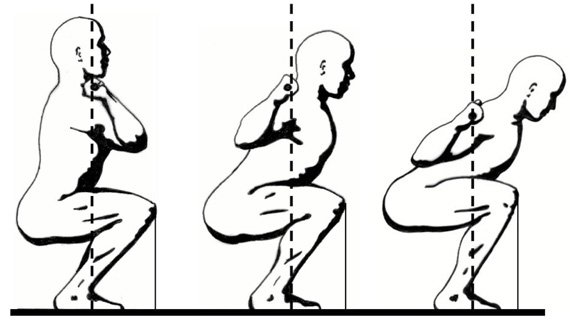"Physical strength is the most important thing in life."I love opening lines like this. It's from Mark Rippetoe's Starting Strength, the gospel of barbel lifting. Rippetoe is worth your consideration, even if he recommends squatting three times a week. He's a gym owner, trainer, and author. At 56, he can deadlift 500 lbs. He argues that humans evolved to deal with physical strain, and the cushy lives many of us now lead don't erase millions of years of evolution. At base, we're physical creatures. For this reason, exercise isn't a cure for health issues; it's the thing without which we can't be healthy.
The fun thing about lifting weights is that you get stronger over time in an easily measurable way. You don't have to guess to see if it's working. The way to do it is to start with small amounts of weight and increase incrementally. If you work your way up, your muscles and bones will get stronger, your posture will improve, and you'll be able to deal more effectively with athletic and everyday strains.
 |
| Squats should be done naked and hairless |
I can testify that my running ability has improved since doing squats again (though not three times per week). After getting a stress fracture in my hip last year, my theory is that squatting will strengthen my bones and musculature so that it doesn't happen again. We'll see.
Rippetoe provides a nice example to help understand how your body adapts to stress. Imagine you want to get a base tan for the summer, and you decide to lay outside at lunch 15 minutes (7.5 minutes each side) per day for an entire month. You might think you'd get pretty tan. But because your body will only grow to withstand 15 minutes of sun, you'll be only a little darker. In the same way, you can't go to the gym every week, lift the same weights, and expect to get stronger. Your body will only get as strong as it is challenged to be.
It may seem obvious that we get stronger by gradually increasing strain on our bodies, but it's actually kind of remarkable. If you gradually increase strain on a glass or even a rock, for example, it will just fracture. Bodies, like economies, are complex systems that, when stressed, become stronger. Or, at least, that is Nassim Taleb's argument in a recent book. Taleb is an investor and a professor of finance, and he became famous for predicting the financial crisis of 2008 in 2007.
When we try to insulate complex systems from smaller shocks, we are less able to deal with bigger shocks, or what Taleb calls 'black swans' (no relation to the Aronofsky movie). According to Taleb, mainstream economists are to blame for the seriousness of the current recession. They believe that recessions can be avoided altogether through the policies of governments or central banks. But while it may be possible to cushion small shocks, such periodic strains actually make economies stronger and so should not be anticipated or minimized.
 |
| The 2008 recession or a failed attempt to move the fridge? |
Enough about economies and bodies. What about, say, brains? Studies show that keeping up mental activity after retirement can help stave off Alzheimer's. This makes sense: if you don't use it, you lose it. However, I'm not sure that trends like Sudoku do much more than improve your Sudoku abilities. This is one reason why many retirees return to school.
The latest trend is sites like lumosity.com, which promise to improve your memory, attention, and IQ. Again, the piecemeal approach these sites take is like doing Nautilus machines at the gym. Why work out one muscle at a time when you can do squats, which will work dozens of muscles, improve balance, train coordinated movement, and strengthen your 'core'? That is, squats increase your strength in the ways you'd actually use your muscles. Why stare at a screen doing n-back games when you could read a book, take a MOOC, raise a child, have a stimulating conversation, or pretty much do anything in a reflective way? That is, why not work your brain out in the ways you'd actually use it?

No comments:
Post a Comment